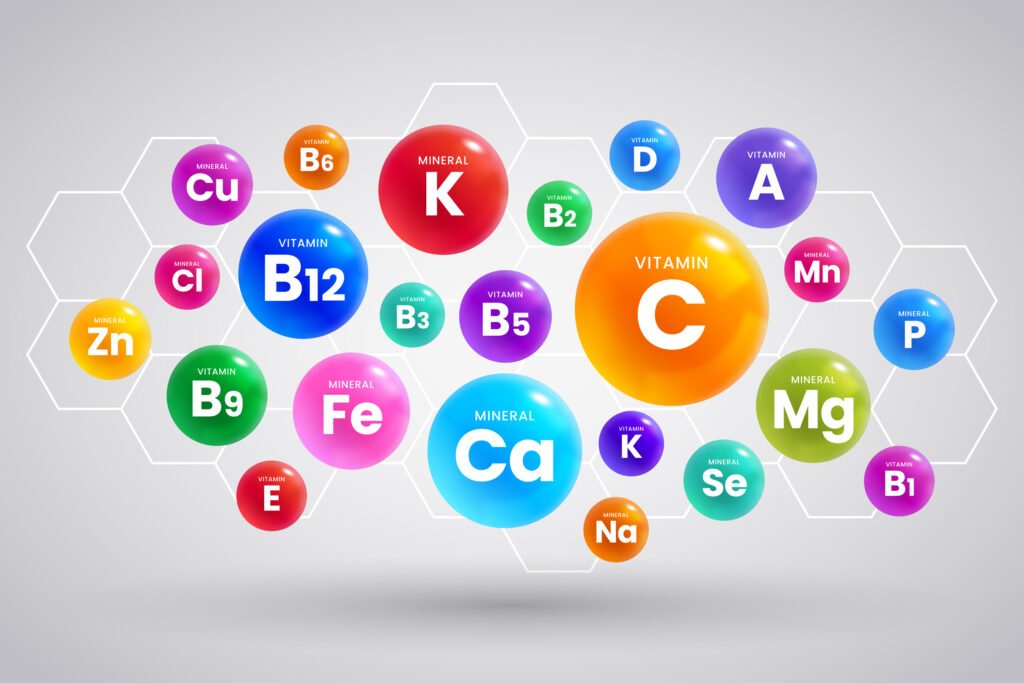Hey there, health-conscious folks! Today, let’s embark on a journey into the
fascinating world of vitamins – those essential nutrients that keep our bodies
ticking like well-oiled machines.

Whether you’re a nutrition newbie or a seasoned wellness warrior, understanding the importance of vitamins and where to find them can empower you to make healthier choices and fuel your
body for optimal performance.
So, what exactly are vitamins? In simple terms, vitamins are organic compounds that our bodies need in small amounts to function properly. They act as catalysts for various biochemical reactions, playing crucial roles in metabolism, immune function, cell repair, and beyond. Without an adequate intake of vitamins, our bodies may struggle to perform these essential functions, leading to a host of health issues. Now, let’s dive into the vitamin alphabet soup! There are 13 essential vitamins, each with its unique functions and dietary sources:
- Vitamin A: This powerhouse vitamin is essential for vision health, immune function, and skin integrity. You can find vitamin A in foods like carrots, sweet potatoes, spinach, and liver.
- Vitamin B1 (Thiamine): Vital for energy metabolism and nerve function, vitamin B1 is abundant in whole grains, pork, nuts, and seeds.
- Vitamin B2 (Riboflavin): Another player in the energy production game, vitamin B2 can be found in dairy products, leafy greens, and lean meats.
- Vitamin B3 (Niacin): Essential for DNA repair and metabolism, niacin is plentiful in poultry, fish, nuts, and whole grains.
- Vitamin B5 (Pantothenic Acid): Involved in synthesizing hormones and cholesterol, vitamin B5 is found in meat, fish, eggs, and legumes.
- Vitamin B6: Crucial for brain development and neurotransmitter synthesis, vitamin B6 is present in bananas, poultry, fish, and potatoes.
- Vitamin B7 (Biotin): Supports metabolism and maintains healthy hair, skin, and nails. Eggs, nuts, seeds, and sweet potatoes are rich sources.
- Vitamin B9 (Folate): Vital for fetal development and cell growth, folate can be found in leafy greens, legumes, citrus fruits, and fortified grains.
- Vitamin B12: Necessary for nerve function and DNA synthesis, vitamin B12 is primarily found in animal products like meat, fish, eggs, and dairy.
- Vitamin C: Renowned for its antioxidant properties, vitamin C also supports collagen synthesis, immune function, and wound healing. Load up on citrus fruits, bell peppers, strawberries, and broccoli to get your fix.
- Vitamin D: Dubbed the “sunshine vitamin,” vitamin D is crucial for bone health, immune function, and mood regulation. While sunlight is a primary source, fatty fish, fortified dairy products, and mushrooms also provide vitamin D.
- Vitamin E: A potent antioxidant, vitamin E protects cells from damage
and supports immune function. - Vitamin K: Essential for blood clotting and bone health, vitamin K can be found in leafy greens, broccoli, eggs, and meat.
Now, let’s break down the classification of vitamins into fat-soluble and water-soluble categories:
Fat-Soluble Vitamins:
- Vitamins A, D, E, and K are fat-soluble, meaning they dissolve in fat and are stored in the body’s fatty tissues and liver.
- These vitamins are best absorbed when consumed with dietary fats.
- Excessive intake of fat-soluble vitamins can lead to toxicity since they are stored in the body and not readily excreted.
- Water-Soluble Vitamins: The B vitamins (B1, B2, B3, B5, B6, B7, B9, B12) and vitamin C are water-
soluble, meaning they dissolve in water and are not stored in the body to the same extent as fat-soluble vitamins. - Water-soluble vitamins are excreted through urine, so they need to be replenished regularly through diet.
- While water-soluble vitamins are less likely to cause toxicity, excessive intake can still have adverse effects.
So, why are vitamins so crucial for our health? Well, they act as coenzymes, which means they assist enzymes in catalyzing biochemical reactions in the body. From converting food into energy to synthesizing neurotransmitters, vitamins play a starring role in nearly every bodily process.
But here’s the catch: Our bodies can’t produce most vitamins on their own, so we must obtain them from our diet. That’s where a balanced and varied diet comes into play. By incorporating a colorful array of fruits, vegetables, whole grains, lean proteins, and healthy fats into our meals, we can ensure we’re getting a wide spectrum of vitamins to support our overall health and well-being.
Now, let’s highlight ten examples of vitamins and their roles in the body:
- Vitamin A: Supports vision health, immune function, and skin integrity.
- Vitamin B6: Crucial for brain development and neurotransmitter synthesis.
- Vitamin C: Acts as a powerful antioxidant and supports collagen synthesis and immune function.
- Vitamin D: Essential for bone health, immune function, and mood regulation.
- Vitamin E: Protects cells from damage and supports immune function.
- Vitamin K: Necessary for blood clotting and bone health.
- Vitamin B12: Supports nerve function and DNA synthesis.
- Vitamin B9 (Folate): Vital for fetal development and cell growth.
- Vitamin B2 (Riboflavin): Plays a role in energy production and metabolism.
- Vitamin B3 (Niacin): Essential for DNA repair and metabolism.
In conclusion, vitamins are the unsung heroes of our health, working tirelessly behind the scenes to keep our bodies running smoothly. By understanding the different types of vitamins, their functions, and dietary sources, we can make informed choices to nourish our bodies and live our best lives. So, here’s to embracing the power of vitamins and fueling our bodies for vitality and longevity!
